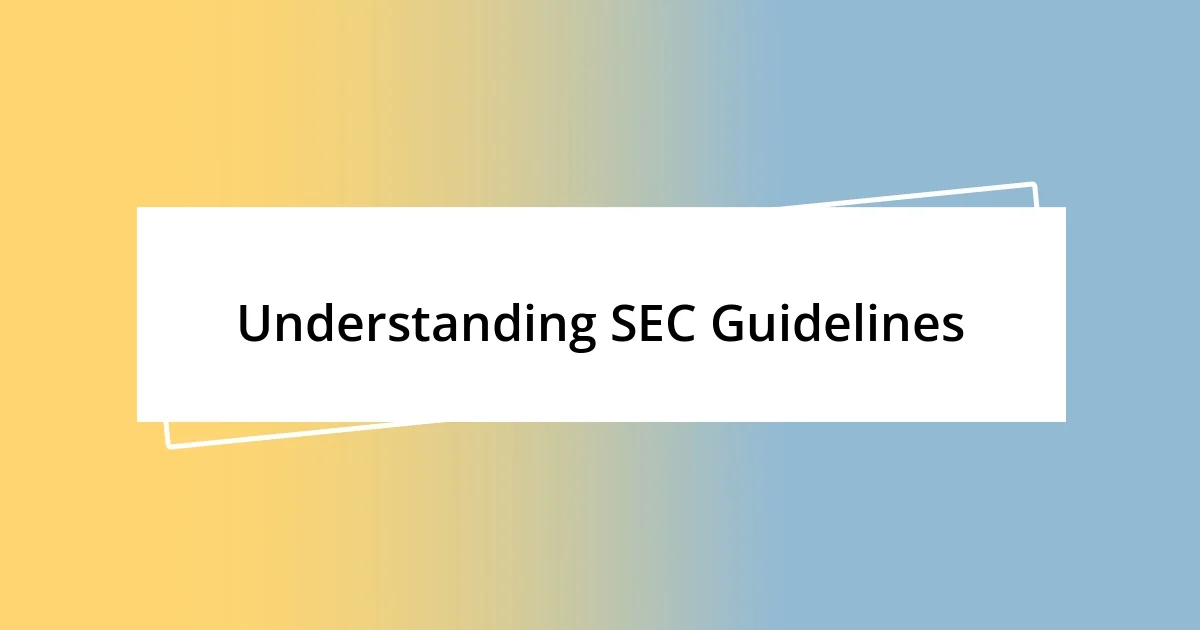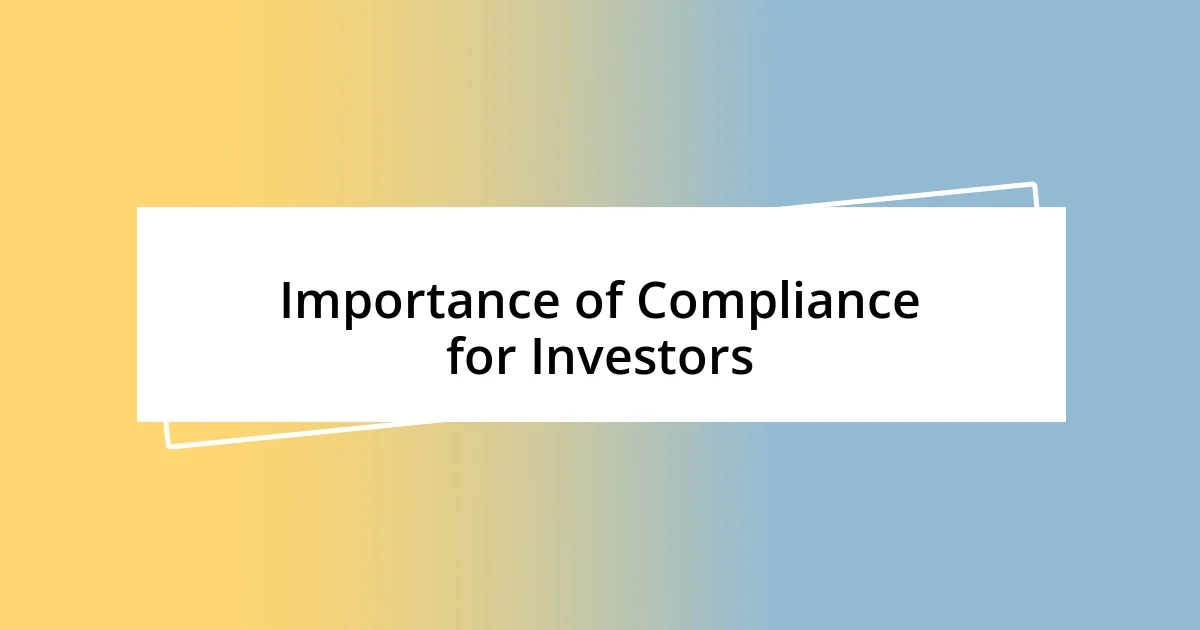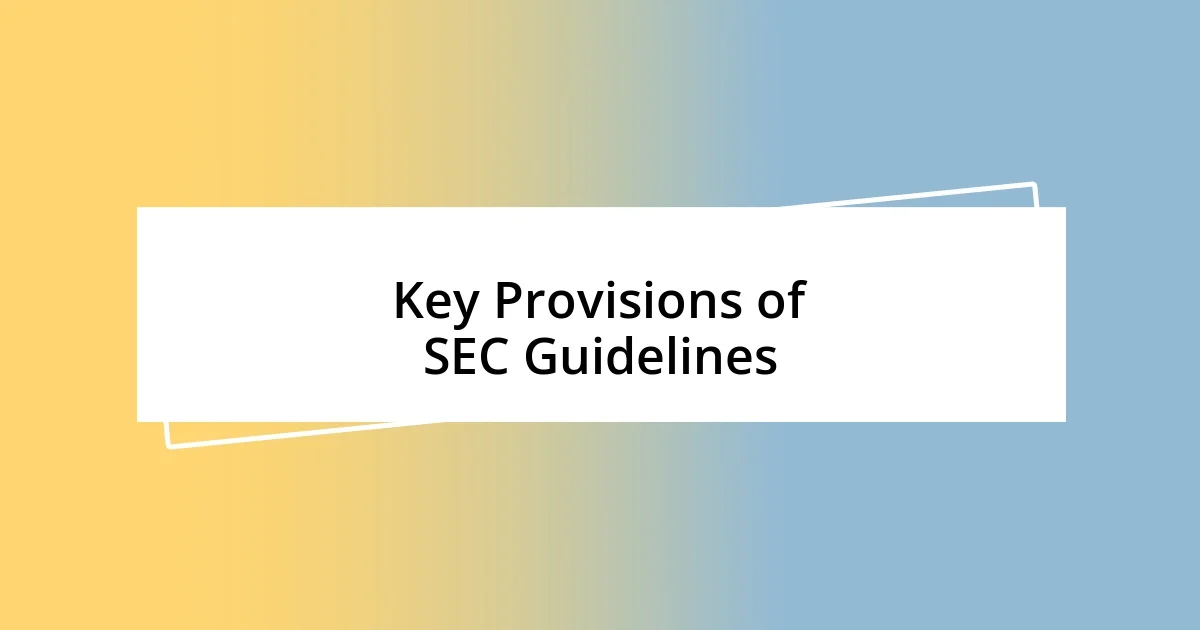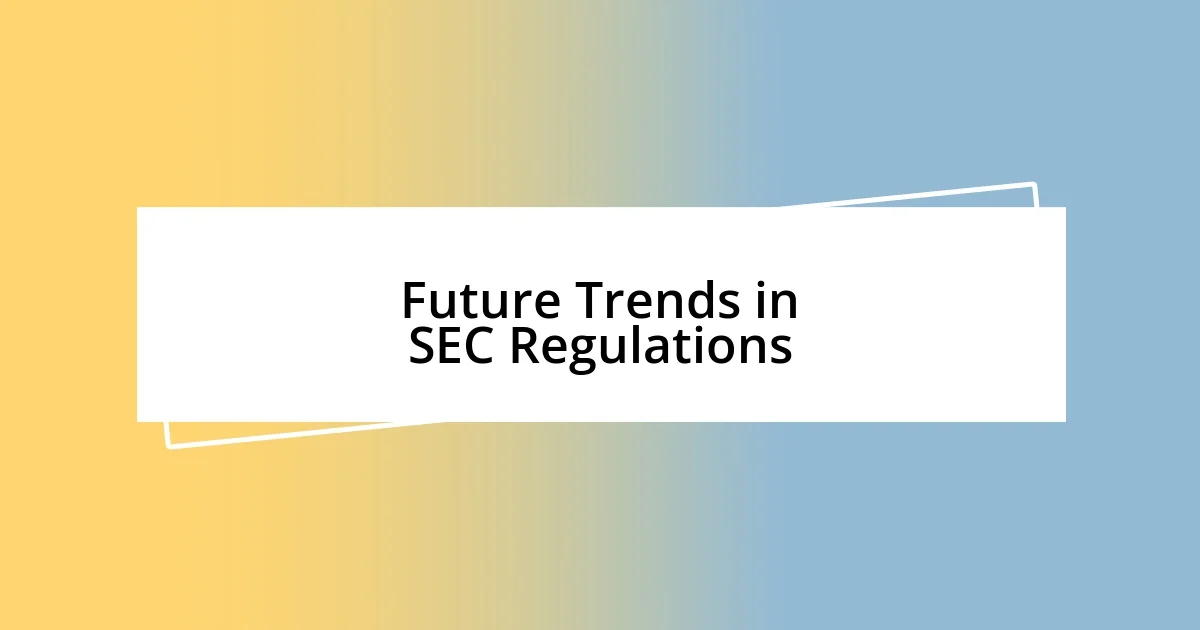Key takeaways:
- SEC guidelines are essential for maintaining transparency, protecting investors, and ensuring fair market practices.
- Recent updates focus on enhanced disclosure requirements for ESG factors and heightened regulations around cryptocurrency, reflecting evolving market standards.
- Future trends are expected to emphasize stricter cybersecurity disclosures and harmonization of regulatory standards across global bodies to improve market integrity.

Understanding SEC Guidelines
Understanding SEC guidelines can seem daunting at first, but they play a crucial role in maintaining transparency and fairness in the financial markets. I remember when I first encountered these regulations; it felt overwhelming as I tried to navigate the dense legal language. Have you ever found yourself struggling to decipher complex rules and wishing for a simple explanation?
The SEC, or Securities and Exchange Commission, lays out these guidelines to protect investors and ensure that companies provide accurate and honest information. When I considered starting my own investment, having a clear understanding of these guidelines was essential for me to make informed decisions. It truly made me appreciate the value of regulatory bodies in safeguarding our interests in the marketplace.
Moreover, these guidelines aren’t just dry documents; they reflect a commitment to ethical standards in business practices. Occasionally, I’ve come across case studies that illustrate the consequences of ignoring these rules—like the 2008 financial crisis, which taught me a lot about the importance of compliance. Can you imagine the chaos in our economy without such regulations? It’s precisely this kind of insight that helps me grasp the real-world implications of SEC guidelines.

Importance of Compliance for Investors
Investing can feel like a rollercoaster ride, and understanding compliance is like having a safety harness. I vividly recall when a colleague lost a significant amount of money due to investing in a company that misrepresented its financial health. If investors aren’t aligned with compliance standards, they risk not only their funds but also their confidence in the market. Trust me, feeling secure in your investments is invaluable for long-term growth.
Furthermore, compliance helps create a level playing field for all investors, big and small. I remember attending an investment seminar where the speaker emphasized the importance of transparency; it struck me how compliance could cultivate trust between companies and their investors. In my experience, when investors know that everyone is held to the same standards, it enhances overall market integrity and encourages more participation. If you think about it, doesn’t a fair market feel more appealing?
Lastly, compliance guidelines provide a framework for evaluating risks. I often reflect on how I analyze potential investments; understanding SEC rules simplifies this process for me. When I look at a company’s compliance history, it gives me insight into their operational ethos and future prospects. Have you ever researched a company and found comfort in their strong compliance track record? It often leads me to view them as a more reliable candidate for my portfolio.
| Aspect | Importance of Compliance |
|---|---|
| Transparency | Ensures clear and honest communication between companies and investors. |
| Investor Protection | Safeguards investors from fraudulent practices and misinformation. |
| Market Integrity | Creates a fair trading environment, boosting investor confidence. |
| Risk Evaluation | Enables investors to assess potential risks associated with businesses. |

Key Provisions of SEC Guidelines
Understanding the specific provisions of SEC guidelines is pivotal to grasping how they govern the marketplace. I recall a moment when I was reviewing some SEC filings for a potential investment, and it struck me just how detailed these regulations are. They encompass a range of key areas to ensure that the financial ecosystem remains functional and fair. Here are some of the crucial provisions I believe every investor should familiarize themselves with:
- Disclosure Requirements: Companies must provide comprehensive information about their financial performance, ensuring transparency.
- Insider Trading Regulations: These rules help prevent individuals with non-public information from exploiting their knowledge for personal gain.
- Proxy Voting Guidelines: The SEC regulates how companies solicit votes from shareholders, promoting fairness in governance decisions.
- Reporting Standards: Companies are obligated to follow specific accounting practices, which helps maintain consistency and reliability in financial reporting.
Reflecting on these provisions, I remember the nerves I felt as I dug into financial statements for the first time. It was a learning curve, but I began to appreciate how these requirements serve as a protective barrier for investors. It gave me this comforting feeling that there are mechanisms in place—designed to safeguard against deception. Being equipped with this knowledge allows me to navigate the often tumultuous waters of investing with greater confidence, which is something I believe is essential for anyone looking to make informed decisions.

Impact on Market Practices
The SEC guidelines profoundly impact market practices by establishing standards that enforce ethical behavior among market participants. I remember when I first entered the investing world: the idea of knowing that companies had to adhere to strict regulations was both reassuring and empowering. It made me feel like I wasn’t just blindly putting my money into a black box; instead, there was oversight that would hopefully catch any nefarious activities before they affected me. Doesn’t it give you more confidence when you know there are checks and balances in place?
Moreover, these guidelines help shape how companies engage with their shareholders. I found it fascinating when I learned about the proxy voting regulations; they ensure that every voice can be heard in corporate matters. This kind of transparency is crucial for me as an investor, as it opens up channels for engagement and accountability. Have you ever felt frustrated when your concerns as a shareholder seemed to go unheard? The SEC guidelines help bridge that gap, promoting a culture of inclusiveness that I truly value.
Lastly, the evolving nature of these guidelines serves as a response to market trends, pushing companies to adapt and innovate. I recall a discussion with a fellow investor about how new regulations around digital assets have transformed our approach to tech investments. Adapting to these changes isn’t always easy, but it can lead to more responsible practices in the long term. How do you feel about navigating these shifts? For me, it’s a reminder that the market is always in flux, and staying informed is essential to not just survive but thrive.

Recent Changes and Updates
Recently, the SEC introduced updates that include enhanced disclosure requirements for public companies, particularly around ESG (Environmental, Social, and Governance) factors. I remember diving into a company’s sustainability report during an investment review and feeling more invested in their mission. Wouldn’t it be great if all investors had access to this level of detail? Those who embrace these updates can better align their portfolio choices with their personal values.
A significant shift is the tightening of regulations around cryptocurrency. As someone who once hesitated to invest in digital assets due to uncertainty, I now feel a sense of reassurance. Increased transparency and safeguards mean that there’s a framework in place to protect both established and hopeful investors like me. How does this shift influence your confidence in the crypto market?
Additionally, the SEC is emphasizing the importance of board diversity in their guidelines. I recall feeling a mixture of hope and skepticism when I first heard about this initiative at a financial conference. It’s vital for companies to reflect the diverse society we live in, don’t you think? This push towards inclusive governance is not just beneficial for organizations but can positively shape industry standards as a whole.

Practical Tips for Adapting
Adapting to the SEC guidelines requires a proactive mindset. I remember feeling overwhelmed when I first encountered new regulations; however, I soon realized that diving into the details helped me feel more in control. By taking the time to understand these guidelines, I was able to make informed decisions that not only benefited my investments but also aligned with my values. Have you thought about the impact this knowledge can have on your confidence?
One practical strategy is to create a checklist to ensure compliance with disclosure requirements. I started doing this after I missed a critical deadline for a document submission, and it left me anxious. Having that checklist not only keeps me organized but also reinforces my understanding of these guidelines, making the process feel manageable. Isn’t it surprising how a simple tool can make such a difference?
Networking with professionals well-versed in the guidelines can be a game-changer, too. I once joined a local investment group where we discussed regulatory changes and their implications for our portfolios. Those conversations opened my eyes to perspectives I hadn’t considered before. How often do you find yourself missing out on valuable insights just because you haven’t connected with the right people? Engaging in these discussions not only helps clarify complex issues but also fosters a sense of community among investors navigating this evolving landscape.

Future Trends in SEC Regulations
The SEC’s future regulations are likely to focus heavily on the expansion of ESG disclosures. I vividly recall how a well-detailed ESG report changed my perspective on an investment. It made me wonder—will companies take this demand seriously enough to genuinely improve their sustainability practices, or will it just be another box to check? I believe this will elevate the importance of transparent reporting in the coming years.
As technology evolves, I anticipate that the SEC will impose stricter guidelines on cybersecurity disclosures. Having experienced a data breach firsthand, I understand the anxiety that comes from potential vulnerabilities. Shouldn’t investors be entitled to know how well a company protects its sensitive information? This emphasis on cybersecurity will not only safeguard investors but will also encourage companies to step up their security measures.
I suspect that we’ll see more collaboration between the SEC and other global regulatory bodies to harmonize standards. This idea struck me during a recent webinar, where experts discussed how fragmented regulations create confusion among multinational corporations. Doesn’t it make sense for investors and companies alike to benefit from a more streamlined approach? I truly believe that such cooperation could lead to a more robust and secure financial environment.












